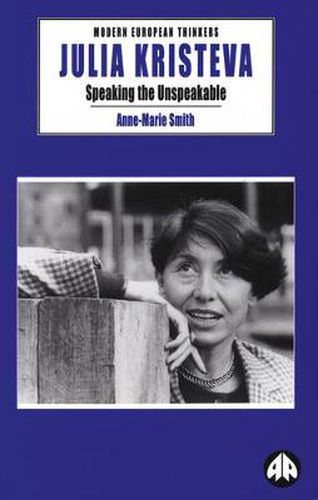Readings Newsletter
Become a Readings Member to make your shopping experience even easier.
Sign in or sign up for free!
You’re not far away from qualifying for FREE standard shipping within Australia
You’ve qualified for FREE standard shipping within Australia
The cart is loading…






“Makes an excellent introduction to Kristeva in its enthusiasm and generosity … lucid and well-conceived.‘ TLS
Julia Kristeva’s most remarkable contribution to modern thought has been her revelation of how pre-verbal experience - poetic, infantile, maternal and spiritual, or simply the experience of suffering - enters language through the processes of literature, art and psychoanalysis.
Anne-Marie Smith’s concise introductory study examines Kristeva in the light of her contemporary activity as writer, teacher and psychoanalyst. Tracing the evolution of Kristeva’s thinking over the last thirty years she draws attention to its conceptual coherence and value as a work-in-progress of cultural critique.
Smith provides close readings of the original texts, new translations and first-hand accounts of Kristeva’s lectures. Kristeva’s influence in Anglo-American thought is set against her place in the French intellectual tradition. She emphasizes Kristeva’s involvement in public cultural activity and personal commitment to psychoanalytic practice as well as her insistent interrogation of the place of women and of foreignness in social structures.
$9.00 standard shipping within Australia
FREE standard shipping within Australia for orders over $100.00
Express & International shipping calculated at checkout
“Makes an excellent introduction to Kristeva in its enthusiasm and generosity … lucid and well-conceived.‘ TLS
Julia Kristeva’s most remarkable contribution to modern thought has been her revelation of how pre-verbal experience - poetic, infantile, maternal and spiritual, or simply the experience of suffering - enters language through the processes of literature, art and psychoanalysis.
Anne-Marie Smith’s concise introductory study examines Kristeva in the light of her contemporary activity as writer, teacher and psychoanalyst. Tracing the evolution of Kristeva’s thinking over the last thirty years she draws attention to its conceptual coherence and value as a work-in-progress of cultural critique.
Smith provides close readings of the original texts, new translations and first-hand accounts of Kristeva’s lectures. Kristeva’s influence in Anglo-American thought is set against her place in the French intellectual tradition. She emphasizes Kristeva’s involvement in public cultural activity and personal commitment to psychoanalytic practice as well as her insistent interrogation of the place of women and of foreignness in social structures.